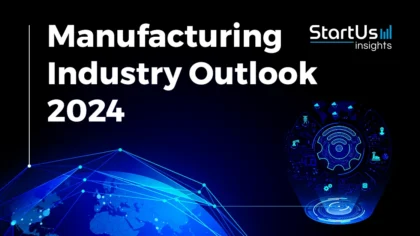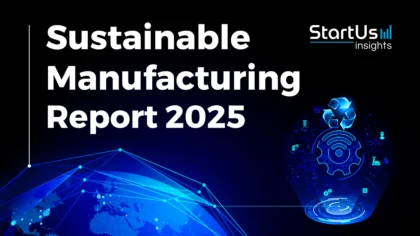In this manufacturing industry outlook for 2024, we explore the dynamic and evolving landscape of the industry, with a special emphasis on the pivotal role of innovation. This analysis employs advanced data analytics to unravel the complex interactions of supply chains, production efficiency, and technological integration in modern manufacturing.
This report was last updated in July 2024.
By scrutinizing data from various industry segments, the report sheds light on key trends, challenges, and opportunities, offering an in-depth understanding of how data-driven approaches are reshaping manufacturing processes. It provides actionable insights for industry leaders and policymakers, charting a course toward enhanced productivity, sustainability, and competitiveness in the manufacturing realm.
StartUs Insights Manufacturing Industry Outlook 2024
- Executive Summary
- Introduction to the Manufacturing Report 2024
- What data is used in this Manufacturing Report?
- Snapshot of the Global Manufacturing Industry
- Funding Landscape in the Manufacturing Industry
- Who is Investing in the Manufacturing Sector?
- 5 Manufacturing Startups impacting the Industry
Executive Summary: Manufacturing Industry Outlook 2024
This report is created using data obtained from the Big Data and AI-powered StartUs Insights Discovery Platform, covering more than 3.7 million global startups, as well as 20K+ technologies and emerging trends across industries. We also analyzed a sample of 8400+ manufacturing startups developing innovative solutions to present five examples from emerging manufacturing trends.
- Sector Evolution: The manufacturing industry is experiencing a transformative phase, marked by technological advancements and shifting market demands, with a slight contraction of 1.76% in industry growth over the last year.
- Workforce Growth: The industry added 622 000 employees, bringing the total global manpower to 13.2 million, indicating resilience and capacity for job creation.
- Innovation and Patents: Notable for its 139 000 patents, the sector demonstrates a strong focus on R&D and technological advancement in manufacturing.
- Global Reach: Top country hubs include the USA, UK, Germany, India, and China, with major city hubs like New York City, London, Melbourne, Shenzhen, and Mumbai leading in manufacturing innovation.
- Investment Climate: An average investment value of USD 11.8 million, with participation from over 10 000 investors and more than 28 000 funding rounds, reflects strong investor confidence and a dynamic market.
- Leading Investors: Significant investments from major entities like Tencent, Goldman Sachs, and Warburg Pincus, totaling more than USD 5.3 billion, demonstrate a commitment to the sector’s growth and innovation.
- Startup Innovation: Featured startups, such as 1000 Kelvin (AI-based defect management in 3D printing), MicroBriTT (micro-milling technology), Upu (factory digital twins), Continuum Powders (sustainable manufacturing), and Lambda Function (CNC machining) highlight the sector’s technological diversity and innovation.
- Future Prospects: The industry is poised for continued growth and modernization, with a focus on efficiency, sustainability, and technological integration.
- Recommendations for Stakeholders: Continued investment in technological innovation, support for sustainable practices, and leveraging global trends for industry advancement.
Explore the Data-driven Manufacturing Report for 2024
The Manufacturing Industry Outlook 2024 uses data from the Discovery Platform and encapsulates the key metrics that underline the sector’s dynamic growth and innovation. Despite a slight contraction of 1.76% in industry growth over the last year, the manufacturing landscape remains robust with 198 000 companies listed in the database, demonstrating the sector’s vast scope and foundational role in the global economy.
The addition of 622 000 employees to the manufacturing workforce showcases the industry’s resilience and its capacity to bounce back and create job opportunities after a challenging few years. The total global manpower now stands at 13.2 million, reinforcing the sector’s status as a major employer and its significance in the worldwide labor market.
The report highlights the innovation front with an impressive 139 000 patents, which illustrates the industry’s continued emphasis on R&D and its dedication to advancing manufacturing technologies. Further, the acquisition of 3277 grants indicates substantial support for the sector’s growth and technological progression.
The top five country hubs—USA, UK, Germany, India, and China—underscore the global spread of manufacturing prowess, with each region contributing uniquely to the sector’s diversity and dynamism. The spotlight on five innovative manufacturing startups reveals a surge in entrepreneurial activity within the sector, pointing to a vibrant ecosystem ripe for new ideas and technological breakthroughs. These startups are at the forefront of manufacturing trends such as automation, advanced materials, and smart manufacturing processes.
What data is used to create this manufacturing report?
Based on the data provided by our Discovery Platform, we observe that the manufacturing industry ranks among the top 5% in the following categories relative to all 20K topics in our database. These categories provide a comprehensive overview of the industry’s key metrics and inform the short-term future direction of the industry.
- News Publications & Coverage: Over 500 000 publications last year show the manufacturing industry’s significant attention and high interest levels.
- Funding Rounds: Our database reveals extensive investment activity in manufacturing with data on over 28 000 funding rounds.
- Manpower: The sector employs over 13.2 million workers and has grown significantly, adding more than 622 000 new employees last year.
- Patents: Manufacturing innovation is very strong, evidenced by the filing of over 139 000 patents, showing a focus on research and development.
- Grants: The industry benefits from a supportive financial setting, receiving over 3200 grants, and helping fund research and technological advancements.
- and more!
A Snapshot of the Global Manufacturing Industry
The manufacturing industry is a crucial pillar in the global economy, showcasing its importance and adaptability. It employs 13.2 million people, supporting numerous jobs and driving industrial productivity and technological progress.
In the past year, the industry added 622 000 jobs, with a 4.9% workforce increase. This growth indicates strong industry health and a recovery from global economic challenges.
Explore the Funding Landscape of the Manufacturing Industry
The sector’s financial growth is notable, with an average investment value of USD 11.8 million. This reflects high investor confidence in its growth potential. Investments focus on automation, machine learning, sustainability, and new materials – all vital for global market competitiveness.
Over 10 000 diverse investors are actively investing in manufacturing. This includes venture capitalists seeking disruptive tech and industrial giants focusing on incremental innovation as well as government support.
Funding Rounds and Market Dynamics
The sector’s vibrancy shows in over 28 000 closed funding rounds. This indicates a mature and innovative market with many growth opportunities. Funding rounds range from early-stage seed funding for startups to large late-stage investments for scaling operations.
These funding rounds also highlight the industry’s shift towards Industry 4.0 tools and practices. This phase emphasizes interconnectivity, automation, machine learning, and real-time data. Investors support ventures that align with efficiency and productivity improvements in the industry.
Who is Investing in Manufacturing & Industry 4.0?
In the manufacturing industry, the leading investors have collectively invested more than USD 5.3 billion, This showcases their significant commitment to propelling the sector forward. These top financial contributors are not just fuelling growth but are also shaping the future of manufacturing through strategic investments.
- Tencent: it has made an impact with USD 885 million invested across 9 companies. This investment strategy is indicative of a broader trend of diverse technology firms delving into the manufacturing arena.
- Goldman Sachs: its investment of USD 770 million in 5 companies exemplifies the confidence financial institutions have in the manufacturing sector.
- Warburg Pincus: channeling USD 706 million into 10 companies, their investments cover a range of manufacturing sub-sectors, focusing on diversification.
- Tiger Global Management: it has cast its net across 13 companies, investing USD 666 million. The variety of companies under its umbrella points to a strategy that seeks to leverage cross-industry synergies and innovation-driven growth.
- Stellantis: it stands out with an investment of USD 656 million in just 2 companies. This indicates a selective strategy that prioritizes depth over breadth, potentially in niche or highly specialized manufacturing.
- Koch Disruptive Industries: its USD 567 million investment in 4 companies highlights its inclination toward companies that disrupt traditional manufacturing.
- European Investment Bank: its USD 550 million investment in 9 companies reflects its commitment to supporting the European manufacturing industry growth.
- Deerfield: its investment of USD 530 million in 5 companies suggests a strategic focus, potentially in healthcare manufacturing or biotechnology.
These investments signal a robust and forward-thinking funding landscape within the manufacturing industry. The strategic distribution of these investments reflects a nuanced understanding of the sector’s potential. This spans high-tech and automation to sustainable practices and emerging manufacturing technologies. The breadth and depth of these investments underline a conviction among top investors that the industry will continue to evolve, driven by innovation and efficiency improvements.
5 Top Examples from 8400+ Innovative Manufacturing Startups impacting the Industry
The five innovative startups showcased below are picked based on data including the trend they operate within and their relevance, founding year, funding status, and more. Book a demo to find promising startups, emerging trends, or industry data specific to your company’s needs and objectives.
1000 Kelvin enables AI-based Defect Management
German startup 1000 Kelvin develops AMAIZE, an AI software that optimizes 3D printing by predicting and correcting defects in real-time. By generating print-ready files, the software analyzes parts and proposes corrections within minutes, compared to traditional methods which take days.
Moreover, the software features an intuitive interface and integrates with various OEM partners. For example, AMAIZE identifies overheating issues to enable cost-effective printing of complex parts on the first try.
MicroBriTT develops Novel Micro-milling Technology
Microbritt is a UK-based startup that offers micromachining services using its patented micro-milling technology. This allows them to precisely machine customer-defined products from a variety of materials at the microscale. The technology finds applications in microfluidics, photonics, biosensors, and MEMS.
The startup works with several materials, including silicon, glass, polymers, lithium niobate, ceramics, and more. Its technology is also capable of rapid fabrication of large products as well as wafer-scale manufacturing.
Upu creates Factory Digital Twins
Turkish startup upu.io offers an end-to-end IIoT solution for factories called upu.tower. The tower allows users to access machine, employee, and production data from any device. The solution includes sensors that monitor machines and transmit data to artificial intelligence models for further analysis.
Some key features include digital twins of factories, predictive maintenance alerts, energy usage reports, and performance metrics for machines, employees, and processes. Upu.io allows manufacturers to reduce costs and improve productivity compared to traditional automation systems.
Continuum Powders facilitates the Transition to Sustainable Manufacturing
US-based startup Continuum Powders offers metal powders for additive manufacturing that achieve net zero emissions. Its unique recycling process transforms only secondary metal materials into powder, saving significantly on carbon compared to other recycling methods.
Continuum ensures full traceability of materials from sourcing through their single-step melt-to-powder conversion process. This process is compact and can be deployed locally at manufacturing sites. Further, Continuum uses only green energy to power its conversion process and sources industrial gasses from renewable sources.
Lambda Function optimizes CNC Machine Operations
Lambda Function develops AI software that assists CNC programmers and machine operators by recommending optimal machining strategies and monitoring machine performance. Its software integrates with CAD/CAM systems and CNC machines to provide insights that reduce rework and tool costs.
The startup’s tools augment the technical workforce in manufacturing companies with higher machine uptime and increased productivity. It also reduces programming time to a few days and improves forecasting of machining costs.
Gain Comprehensive Insights into Manufacturing Trends, Startups, or Technologies
The manufacturing industry report highlights the sector’s resilience and adaptability, underscored by its innovative use of AI and Big Data, the creation of substantial job opportunities, and a strong focus on sustainability and technological advancement. Get in touch to explore all 8000+ startups and scaleups, as well as all industry trends impacting manufacturing companies.











